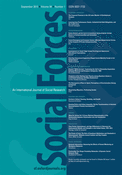-
Views
-
Cite
Cite
René D. Flores, The Resurgence of Race in Spain: Perceptions of Discrimination Among Immigrants, Social Forces, Volume 94, Issue 1, September 2015, Pages 237–269, https://doi.org/10.1093/sf/sov056
Close - Share Icon Share
Abstract
The contemporary relevance of the concept of “race” has been increasingly questioned around the world. In Europe, researchers often look with skepticism at the US emphasis on race, instead highlighting the capacity of culture, especially religion, to explain native opposition to immigrants. Using two distinct data sets, I examine self-reports of discrimination among immigrants in Spain, where elites have long denied racial differences, to understand how the reported salience of boundaries based on race, nationality, and religion change with acculturation. I find that reports of both nationality- and race-based discrimination are relatively common for newcomers, while reports of religion-based discrimination are quite rare. Yet, unlike reports of racial discrimination, reports of nationality discrimination decrease over time as immigrants' cultural differences decline due to their cultural assimilation. For second-generation immigrants, especially non-Europeans, race replaces nationality as the primary explanation for discrimination experiences and reports of religious discrimination grow even more infrequent. I conclude that, from the perspective of immigrants, the recent transformation of Spain into a new immigrant destination has gone hand in hand with the emergence of race as the main symbolic boundary marginalizing non-European immigrants in Spain.



